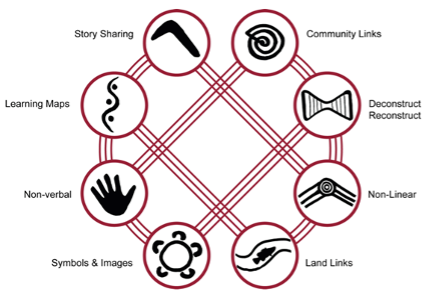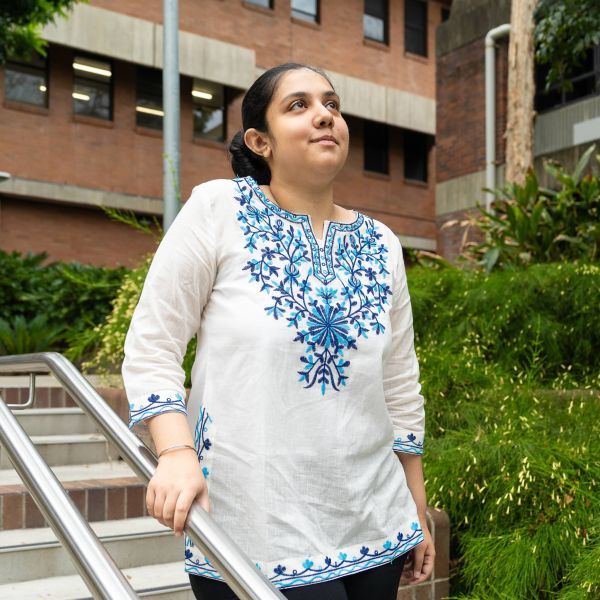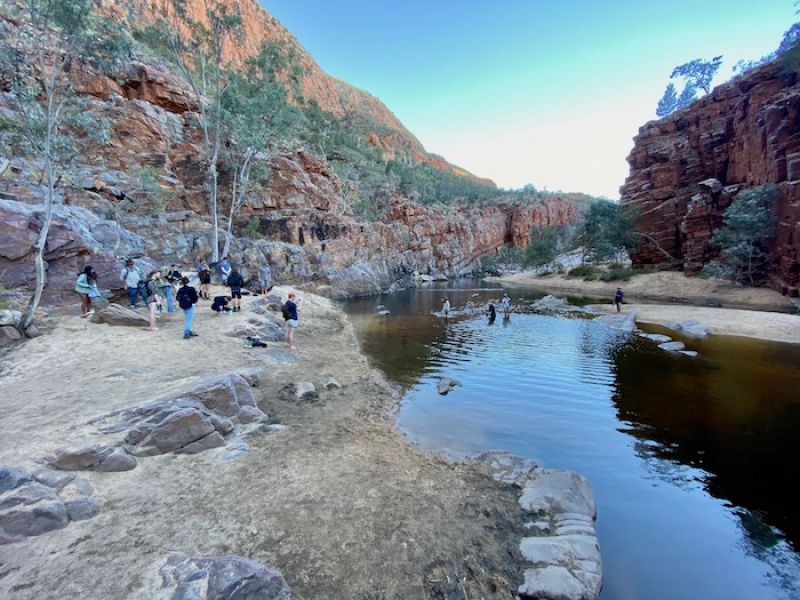
Country-guided practices
To meet the current sustainability challenges and be better caretakers of our environment, architects, designers, and construction managers need to become familiar with Indigenous ways of knowing, being, seeing, and doing. This is accomplished by acknowledging Country as the author, guide, and reference point for creating design that blends, moulds, and correlates with Australia's cultural landscape. Using best practices, Country-informed design meets the specific criteria set forth in the National Standard of Competency for Architects 2021 (NSCA 2021).
We also acknowledge those who walked before us.
Learning on country
As part of their studies with SABE, our students are exposed to traditional smoking ceremonies, teaching from Indigenous staff across our disciplines, learning on and from our bush-campus environment, and the opportunity to undertake special projects based in the Northern Territory, Far North Queensland, and throughout New South Wales.
Country-guided practices in Indigenous design
Incorporating Indigenous Knowledge Systems into the built environment
Embedding the narratives of cultural place into the built environment
Integrating embodied spiritual Knowledge into the built environment
Framing arts-based knowledge in elements of the build environment
Applying relational knowledge and Indigenous methodologies within research
Care for Country and Australia’s First Peoples is an active principle within our School.
Indigeneity both as a value and an animating force, is one of the main driving powers within our School. This value has influenced the design of all of our undergraduate and graduate programs. The focus on Indigeneity extends to SABE’s research efforts with our requirement for Indigenous participation in all its forms.
Our School respects the vast body of Aboriginal knowledge that needs to be shared, for the experience of a different wisdom – including human, societal, and environmental wisdoms.
The eight-ways framework
The eight-ways framework of Aboriginal pedagogy brings Indigenous ways of knowing and being into our classrooms. It comprises eight interconnected pedagogies that are grounded in people and place, which fits neatly with our School’s aims and philosophies.
The approach to teaching and learning is non-linear, introspective and highly reflective, involving repetition and returning to concepts to enable students to gain a deeper understanding of themselves and their learning.

Source: 8 WAYS by Dr Tyson Yunkaporta

Full circle in STEM: Lara’s journey from student to mentor
Lara Godde first became involved with HunterWiSE as a Year 8 student in 2018. At the time, she wasn’t entirely sure what she wanted to do with her future, but participating in the program proved to be a turning point. As part of the HunterWiSE Schools Outreach Program, Lara and two friends from St Mary’s Catholic College Gateshead designed Fit Near Me..
Read more

From Delhi to Newcastle, full tuition scholarship makes STEM dreams come true
From taking apart video game consoles as a child, to winning software development competitions in school, University of Newcastle Computer Science student Saihajleen Kaur has always dreamt of being behind the scenes of computer tech development.
Read more

Centuries-old coolabahs reveal how water and climate shaped the Gwydir Wetlands
New science has revealed some of the Gwydir Wetlands’ iconic coolabahs and river red gums are up to 500 years old.
Read more

Families discover hidden coastal life through hands-on science workshops
Families from across the Hunter Region explored the hidden life beneath their feet these school holidays, joining University of Newcastle environmental science academics for hands on coastal workshops at Nobbys and Stockton beaches. Run in partnership with the City of Newcastle as part of the Coastal Curiosity program.
Read more

Engineering Student for a Day inspires future engineers
From renewable energy breakthroughs to robotics challenges, future engineers had the chance to experience first‑hand what their careers could look like. The School of Engineering welcomed over 90 Year 11 students from 12 schools across the Hunter Region to Engineering Student for a Day.
Read more

Newcastle scientist named among UNESCO Quantum Top 100
University of Newcastle quantum scientist Dr Lachlan Rogers has been named among UNESCO’s global Quantum Top 100, recognising leading researchers shaping the future of quantum science and technology.
Read more
The University of Newcastle acknowledges the traditional custodians of the lands within our footprint areas: Awabakal, Darkinjung, Biripai, Worimi, Wonnarua, and Eora Nations. We also pay respect to the wisdom of our Elders past and present.

































